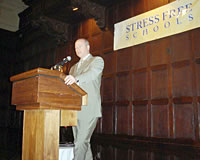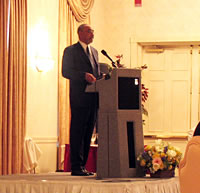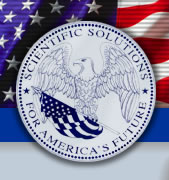Consciousness-Based Education Tour
Reaches 4,000 Educators, Generates New Programs

Dr. John Hagelin and a renowned panel of educators and scientists recently visited over 40 cities in the U.S. and Canada, speaking to more than 4,000 principals, superintendents, teachers, school board members, and local government leaders about Consciousness-Based education and its proven impact on student development and educational outcomes. These tours created a huge demand for the Transcendental Meditation program in high schools and middle schools. As a direct result of these tours, more than 2,000 students and faculty have learned the TM technique in schools across the nation — and educators from almost 100 additional schools are planning to implement Consciousness-Based educational programs.
Working closely with the David Lynch Foundation, which provides grants to support in-school TM programs, Dr. Hagelin and key staff of his Institute of Science, Technology and Public Policy have also helped organize and oversee the implementation of these new Consciousness-Based educational programs in schools across America. In addition, David Lynch, Dr. Hagelin, and key Institute staff have met recently with several extremely wealthy philanthropists to promote these programs and have raised significant additional funding for the David Lynch Foundation. These efforts will ensure that Consciousness-Based education will be available in many more schools in the near future. For more information, visit www.davidlynchfoundation.com.
“Two years ago, when we held education conferences in New York City and D.C., school principals might say, ‘Let’s set up a pilot program for 20 students,’” said Bob Roth, media director for the Institute. “Now they say, ‘Let’s involve the whole school.’ I have never before seen this degree of seriousness and receptivity among educators. When they hear about the impact of the TM technique in the classroom, they say, ‘We need this — and we need it now.’”

Institute fellow Sarina J. Grosswald, Ed.D.
Research on ADHD. As part of these educational initiatives, Dr. Hagelin’s Institute is helping to fund and oversee a major research project to investigate the impact of the Transcendental Meditation program on attention deficit–hyperactivity disorder (ADHD) and other learning disabilities in students. Institute fellow Sarina J. Grosswald, Ed.D., an expert in cognitive learning and Director of Continuing Medical Education for the American Medical Women’s Association, is directing this project at the Kingsbury Day School near Washington, D.C., a school that is nationally renowned for its work with children with learning disabilities. Preliminary results from this groundbreaking research are so promising — and so potentially revolutionary for the field of education — that they have been featured in the International Herald Tribune, on CNN, and in Business Week. (To see a videoclip of ADHD students before and after they learn the Transcendental Meditation technique, click here. To view a video clip from the highly respected PBS news show To the Contrary about the benefits of TM practice for children with ADHD, click here.)

Dr. George Rutherford
speaks to educators
Ongoing programs. In addition to these new projects, Dr. Hagelin and his Institute staff are is continuing to oversee and support many ongoing TM programs in high schools and middle schools across the nation. As an example, the Institute is working closely with Dr. George Rutherford, principal of the Ideal Academy Public Charter School in Washington, D.C., to expand the ongoing in-school TM program there. In September 2006, 30 new staff and faculty were instructed in the TM technique and trained as group meditation leaders for the students. Then the entire high school and middle school student body — more than 100 students — was taught the TM technique, with “quiet time” periods instituted every morning and afternoon as part of the school day. Here are a few recent quotes from meditating teachers and students:
“I had such a wonderful meditation yesterday. I felt so much better, afterwards. I don’t know why I ever thought I didn’t have time for this. I always want to feel that way!”
—Kim Caldwell, 5th grade teacher“I like meditating because when I’m angry, I meditate and I lose my anger and stress and I feel better inside.”
—Michelle Taylor, 6th grade“I’ve noticed that I’m nicer to people now.”
—Rohjanae Mathis, 7th grade girl“Now, when someone says something bad about me, I just ignore them.”
—Elsie Mayo, 7th grade girl


